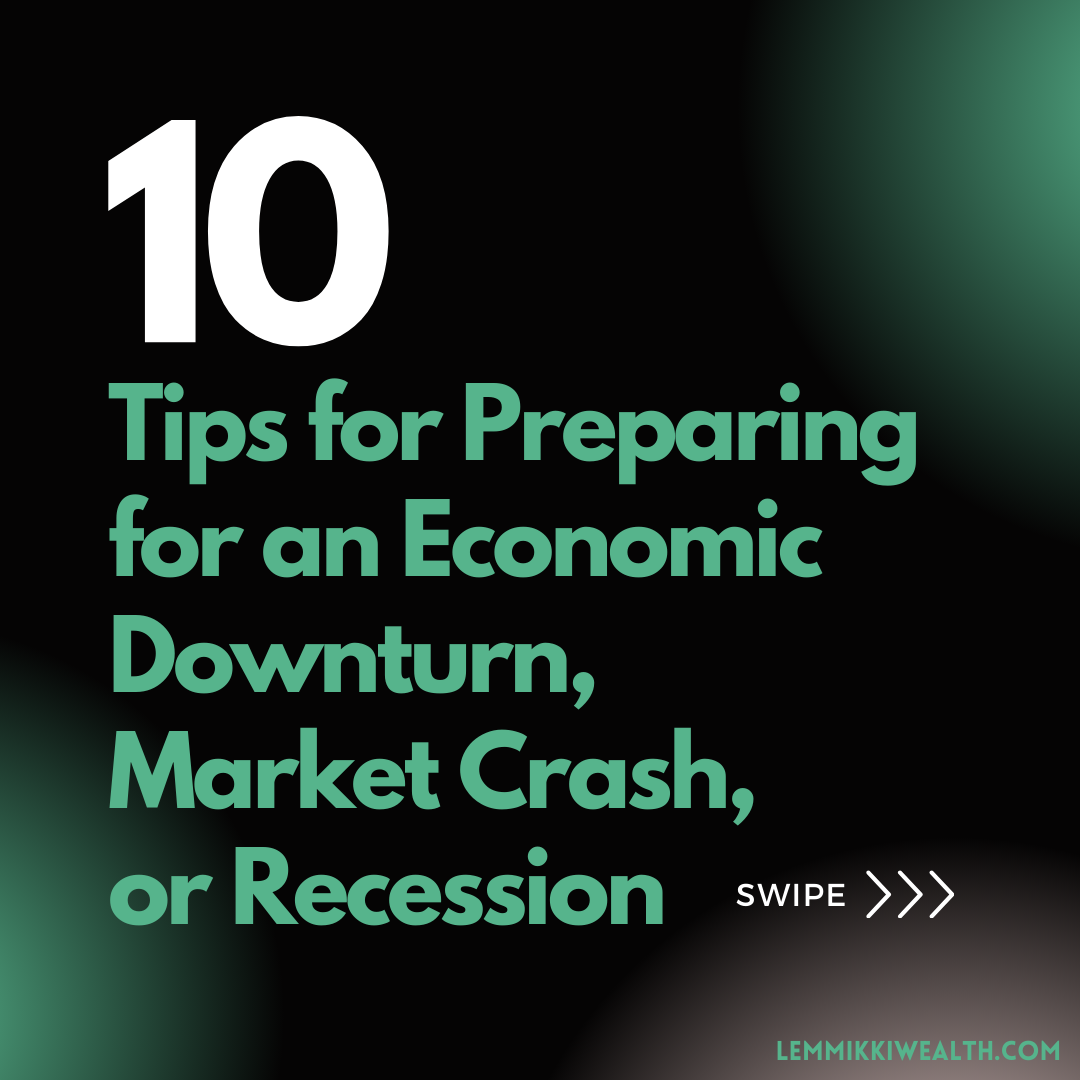10 Tips to Prepare Your Finances
Do you remember any of the previous recessions? How did they impact you or your family, and is there anything you wish you had done differently before those recessions? While we can’t predict the exact timing of economic downturns, market crashes, or recessions, we can learn from history and prepare as best we can for future ones. Taking proactive steps can help restore a sense of control during periods of economic uncertainty.
The Great Recession of 2007 was the first recession that really affected my husband and me as adults. It impacted the decisions we made, and I feel we missed out on a great opportunity had we been more prepared. It wasn’t until 2020 that I realized how fragile our economy and world are, and that recessions occur fairly frequently and present opportunities for those who are prepared. This is when I started researching the history of recessions and ways to be more prepared. I didn’t want to miss out on a potential great opportunity again.
I learned
On average, recessions happen every 6-8 years.
Money is like energy; it doesn’t just disappear, it transfers.
More millionaires are made during market crashes and recessions than at any other time.
The bigger the crisis, the bigger the opportunity for those prepared.
This made me want to understand what I could do to set my family up in the best way possible for the next recession.
Here are 10 tips I learned for Preparing Your Finances for the next economic downturn, market crash, or recession.
A well-structured budget is the most powerful tool at your disposal. This will help you cut back on areas where you may be bleeding money.
Identify your non-negotiables, allocate savings, and cut back on unnecessary spending.
Make yourself indispensable to your employer and increase your streams of income.
This is imperative as it’s your shield to protect you.
Finding your S.W.A.N. (Sleep Well At Night) number for your emergency funds will help reduce your stress and improve your sleep, which in turn will benefit your overall health. Health IS Wealth!
Groceries are where most people blow their budgets. Find ways to cut back grocery costs.
Take inventory of what you have and meal plan using what you have on hand. Then look at sales ads and tack on sale items for next week/month’s meal plan.
Focus on vegetables as your main dish and add proteins as a side dish to your meals.
Don’t shop hungry! Create a grocery list and STICK TO IT.
Stretch the proteins by using recipes such as casseroles, stir-fries, and soups, adding proteins to salads, or substituting quinoa, lentils, or beans for proteins.
Stock up on shelf-stable items when they are on sale.
Make Freezer Meals and/or Pantry Meal Kits to limit the need to rely on fast foods.
Intermittent fasting is what some say they use to save money but speak with your physician first as your health is your largest asset.
Pay Down Debt and Avoid New Debt
Whoever controls your money, controls you. This is why it’s crucial to get out of debt and stay out of debt.
Diversify, Diversify, Diversify
We can study charts and predict trends, but no one knows the future. The best strategy is to ensure your money and investments are well diversified.
Diversify your money into different asset categories.
Diversify your money into different bank types.
Diversify your money into different preps.
This could help you scoop up assets that might go for cheap during these economic downturns.
Learn about different assets during good or stable economic times so you will understand good opportunities during recessionary times.
Valuable assets during recessions often hold (and some may even gain) value helping your net worth. Some assets could even be a stream of income.
Watch for sales on your favorite assets and scoop them up when they are cheaper.
Be cautious about locking in your losses, and recessions can be a huge buying opportunity.
“Be fearful when others are greedy and be greedy when others are fearful.” Warren Buffett
-Bonus Tip-
Per Dave Ramsey, this is the fastest way to ruin a relationship. Is this amount worth losing your friendship over?
Only lend what you can afford to lose. If someone asks to borrow $100, you can say, “I cannot lend you $100, but I can give you $10 (or whatever amount works for you), and you don’t have to pay me back.”
Be Proactive - Not Reactive!
Now is the time to learn, pray, and prepare for opportunities that may come your way.
These may help you crush it before any economic crisis crushes you.
Let us know if you have any other tips to share. We are all learning together!








